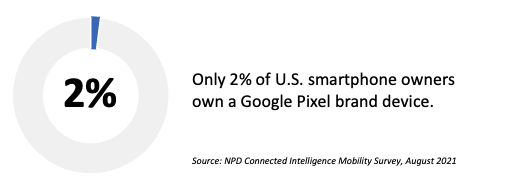
Metro phones hit the Walmart shelves
Metro by T-Mobile, the nation’s largest prepaid brand (in terms of the number of subscribers), last week joined the carrier lineup at Walmart, the nation’s top distribution center for prepaid phones and services. Metro celebrates this new venture with an exclusive offer, giving new customers purchasing a phone and selecting an unlimited plan a month of free service (advertised as $60 savings). Walmart’s Metro device lineup includes several popular sub-$300 phones such as the REVVL V ($79), Samsung Galaxy A02s ($119) and Galaxy A12 ($149), OnePlus Nord 200 5G ($189), and Motorola g Stylus 5G ($219). Incidentally, T-Mobile’s Magenta postpaid plans and phones will be making their debut at Walmart on November 1, 2021.
The NPD Take:
- T-Mobile (and its sub-brands) has been out of the Walmart lineup (and other national retailers such as Best Buy) for the past 7-8 years, and despite this, the carrier has performed remarkably well via its own channels. However, the pandemic has changed the role of national retail for the mobile sector, causing T-Mobile to reconsider its channel strategies.
- Rival Verizon’s attempt to acquire Tracfone, which enjoys the lion’s share at Walmart, further amplified T-Mobile’s motivation to enter Walmart given that Verizon shares the same ambitions in using Walmart as a distribution hub to reach out to suburban and rural communities with Fixed Wireless Access Internet services based on the new 5G network solutions.
- We expect to see T-Mobile and Metro launch aggressive switcher campaigns targeting StraightTalk customers, who soon will be a part of the Verizon user base.
Google takes another shot at flagships
We previously reported on Google’s unorthodox debut of the Pixel 6 series when the company teased the community with a webpage and Twitter feed and then showcased the phone live in its NYC Google Store display. The wait is finally over as the new Pixel 6 and the Pixel 6 Pro phone are now commercially available through all the major U.S. carriers. The new phone, as Google confirmed earlier, is powered by Google’s own SoC (System-on-Chip) solution dubbed Tensor. Google claims that the new silicon runs machine-learning and artificial-intelligence algorithms to enhance the phone’s imaging and speech-recognition capabilities, thus providing a superior experience over competitive models out there. The new Pixel 6 carries a $599 price tag, while the flagship Pixel 6 Pro will retail for $899 before subsidies. Notably, all three postpaid carriers offer aggressive subsidies (up to $700 discounts with trade-in at AT&T and Verizon, and up to $900 at T-Mobile) on the new Pixel 6 Pro, though phone MSRPs vary depending on the carrier due to the varying 5G hardware requirements. Incidentally, Google is complementing the phone with a new service dubbed Pixel Pass, which is offered through the Google Play Store and Google Fi and allows customers to buy the phones for $45/month (the Pixel 6) or $55/month for 24-months. The Pass service bundle includes the phone as well as access to 200GB of Google One storage, Google Play Pass, YouTube Music Premium, YouTube Premium, device protection/warranty plan, and bi-annual upgrades.
The NPD Take:
- The new Pixel 6 series’ specs including the homegrown processor, outstanding design features such as the camera bump in the back, are clear statements that Google wants to take another shot in the flagship Android market, which desperately needs new contenders and extra innovation to stop the migration to Apple, and balance Samsung’s growing dominance.
- U.S. carriers, especially Verizon, have given Google considerable marketing support with the hope of having a premium category contender for range diversification, but earlier Pixel variations have not been able to build a substantial base of followers. To Google’s luck, U.S. carriers have limited alternatives to push against Samsung and Apple, thus the new Pixel 6 series flagships should again enjoy considerable marketing support assuming the new Tensor solution will be on par with the high-end Snapdragon chipset performances.
- The new Pixel Pass service is intriguing, though limiting the service to Google’s own channels will limit its potential. The carrier route is the ultimate one for Google to expand its limited user base, and the company (or its carrier partners) should consider building service bundles for customers who will be procuring from carrier channels.